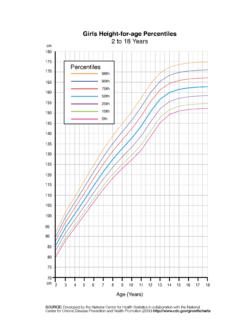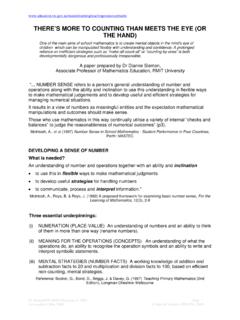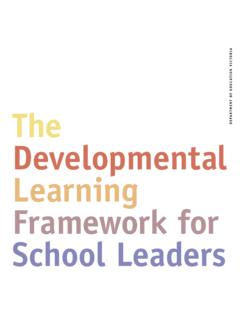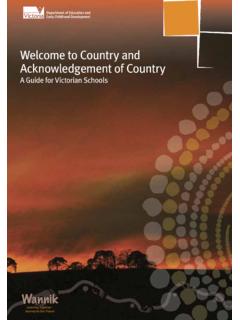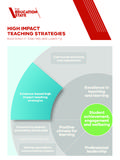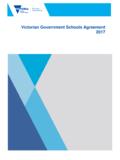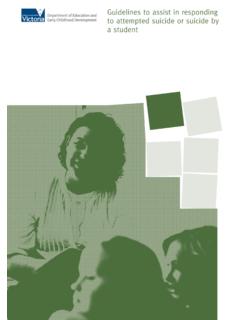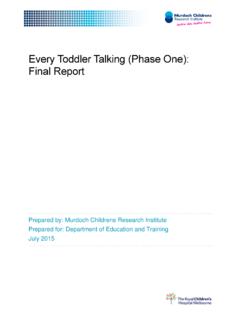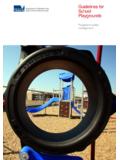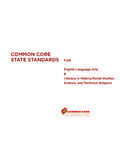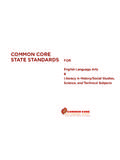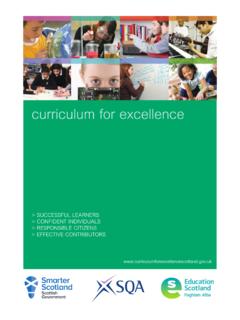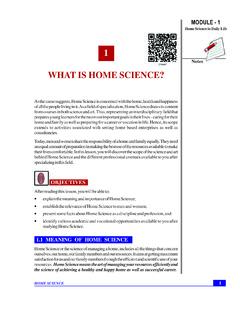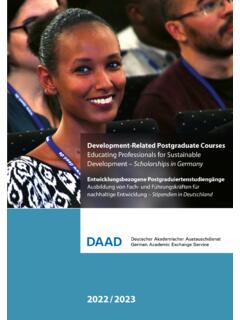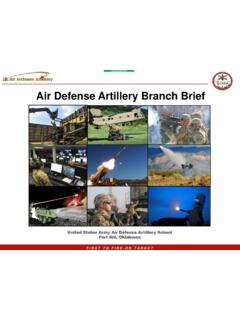Transcription of use by primary teachers in the teaching of fundamental ...
1 An activities resource designed for use by primary teachers in the teaching of fundamental motor skills to students in their formative Motor Skills contribute to lifelong participation in physical Motor Skills Activities Resource Fu n d a m e n t a l mo t o r Sk i l lSAn Activities Resource For Classroom teachers Page ii fundamental Motor Skills Activities Resource State of VictoriaDepartment of Education, Victoria, 1998 Printed June 1998 Updated as a web based resource in relation to the Victorian Essential Learning Standards 2009 ISBN 0-7306-9082-2 AcknowledgementsThe Department of Education is pleased to acknowledge the following individuals for their contribution to the development and publication of this resource for ManagementIan MaddisonMary Wilson (ACHPER Victorian Branch)WritersDr Jeff Walkley (Coordinating Writer)Debra ArmstrongPhil ClohesyReviewersKerryn Andersen (ACHPER Victorian Branch)
2 John BirchallIvan CocksSue KuefferRaeline McAlisterStephen MetcalfeTass NicolaGarry PowellMargaret PurchaseGraeme RenshawGayle RogersNoel StevensThe Department of Education welcomes any use of this publication within the constraints of the Copyright Act. Provided acknowledgement is made to the source, Victorian government and non-government schools are permitted to copy material freely for the purpose of teaching students in schools, or for communication with parents and others in the community. When a charge is authorised for supplying material, such charge shall be limited to direct costs only. When the material is to be sold for profit, written authority must first be requests for uses not specifically permitted by the Copyright Act should be submitted in writing to the Copyright Officer, Department of Education, GPO Box 4367, Melbourne Vic 3001, by the Physical and Sport Education Section, Department of Education, GPO Box 4367, Melbourne Vic 3001.
3 Motor Skills Activities Resource Page iiiTable of ContentsIntroduction 1 Activities Catch 6 Kick 16 Run 26 Vertical Jump 36 Overhand Throw 46 Ball Bounce 56 Leap 66 Dodge 76 Punt 86 Forehand Strike 96 Two-Hand Side-Arm Strike 106 Activity Index 116Fu n d a m e n t a l mo t o r Sk i l lSAn Activities Resource For Classroom teachers Page iv fundamental Motor Skills Activities Resource fundamental Motor Skills Activities Resource Page 1 IntroductionAbout This Activities ResourceFundamental Motor Skills - An Activities Resource for Classroom teachers has been developed to complement the publication fundamental Motor Skills - A Manual for Classroom teachers (1996).
4 It is recommended that this activities resource and the manual be used in conjunction with each other. By doing so, teachers will be able to: identify the essential fundamental motor skills and their components select activities to teach fundamental motor skills provide specific feedback to students evaluate student learning record student progress in a clear and understandable to Use This Activities ResourceThe resource provides over 260 activities which teachers can incorporate into a school physical education program in the teaching of fundamental motor activities relate specifically to the 11 motor skills which were previously identified as those most essential for primary school students
5 To master: Catch Kick Run Vertical Jump Overhand Throw Ball Bounce Leap Dodge Punt Forehand Strike Two-Hand Side-Arm StrikeEach of these skills is presented in a separate section incorporating 24 activities. At the beginning of each skill section a common format includes: a series of teaching hints to assist the development of correct technique the identification of common errors associated with learning specific skills an activities summary chart which lists the activities within the specific skill section, provides a difficulty rating for each activity and identifies skill components which can be emphasised in each the activities have been rated according to difficulty.
6 teachers may choose to modify an activity to a lower or higher degree of difficulty according to the ability of in teaching fundamental Motor SkillsWhen teaching these activities to students, it is recommended that teachers review the information from Sections A and B in fundamental Motor Skills - A Manual for Classroom teachers (pages 3-14).The following information should be remembered when teaching fundamental motor skills: fundamental motor skills should be taught as part of a physical and sport education program, and not as an isolated skills program. fundamental motor skills are not easy for students to learn.
7 teachers should aim to have students master a skill rather than just experience a skill. Most skills used in sports and movement activities are advanced versions of fundamental motor skills. For example, throwing in softball and cricket, the baseball pitch, javelin throw, tennis serve and netball shoulder pass are all advanced forms of the overhand throw (see Diagram 1). During the early primary school years (Prep - 3) students must be given the opportunity to learn the essential motor skills upon which later learning is dependent. These fundamental motor skills are often used by students at play. Table 1 (see page 2) indicates the suggested levels at which the essential fundamental motor skills should be introduced and mastered.
8 During the later primary years (Years 4 - 6) students should be taught a broad range of transitional, or lead-up, motor skills and activities. Examples of skills and activities in this group include the basketball dribble, modified netball, paddle tennis and modified baseball. The skills and activities at this level may be combined or modified in various ways, practised with or without equipment and taught through individual practice or by incorporating them into game structures. Mastery of these fundamental motor skills by students is necessary if optimum development of higher level skills is to occur.
9 Students who do not master these skills are less able and often less willing to persist with the difficult task of learning more complex motor skills, and will avoid activities which expose them to public failure . Ultimately, such students become disillusioned and may reject participation in physical activity as part of their 1: Relationship Between fundamental Motor Skills and Specific Sport Skills (Overhand Throw)(Source: fundamental Motor Skills - a manual for Classroom teachers , 1996)SoftballCricketVolleyballBadmintonN etballBaseballJavelinTennis Page 2 fundamental Motor Skills Activities Resource Diagram 2: Relationship of fundamental Motor Skills to Physical and Sport Education CurriculumKEY LEARNING AREASTHE ARTSENGLISHHEALTH AND PHYSICALEDUCATIONS cope of Physical and Sport Education in SchoolsLANGUAGES OTHERTHAN ENGLISHMATHEMATICSSCIENCESTUDIES OF SOCIETY AND ENVIRONMENTTECHNOLOGYFUNDAMENTAL MOTOR SKILLSO utdoorAdventureActivitiesPhysicalFitness GymnasticsBallHandlingAthleticsMotorSkil lsAquaticsDanceGamesSportEducationSportA ctivities With a Learning FocusMany of the activities included in this resource can be played as games.
10 Games can be very motivating for students and, if used appropriately, can aid students learning of fundamental motor skills. In contrast, games which are played for the sake of playing a game, without a learning focus, do not assist students in learning fundamental motor of a learning focus in a game include the highlighting of a fundamental motor skill or components of a fundamental motor skill, a game strategy, a discussion on how to work cooperatively or how to accept winning and an activity from this resource is used to teach a fundamental motor skill, it is important that teachers .
